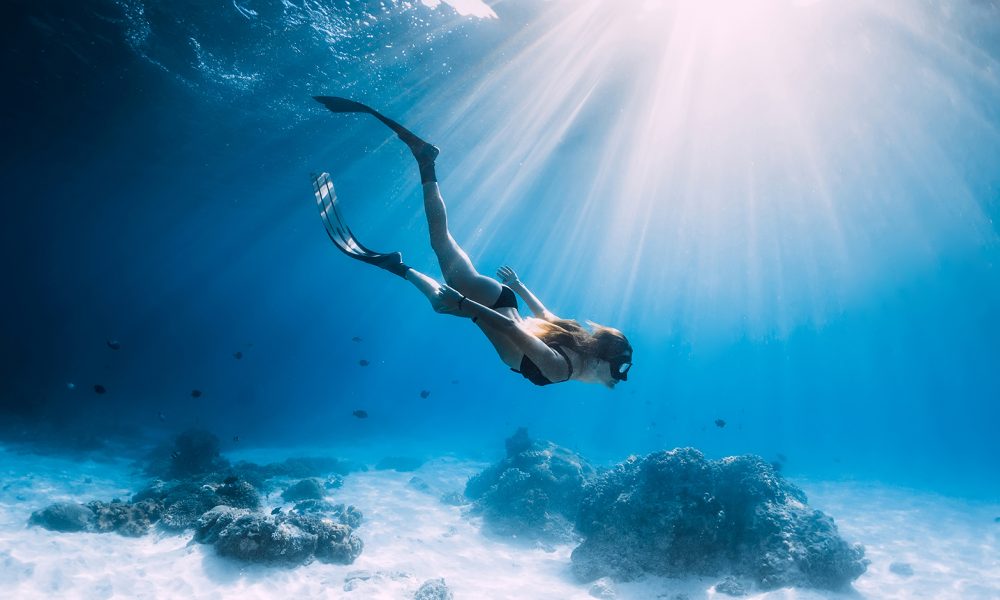

Imagine floating on the water’s surface, taking that deep breath, and preparing to dive. The thrill of immersion is moments away, and the underwater world beckons. However, here is the snag: instead of descending gracefully, you remain buoyantly on the surface, much like a stubborn cork. Or perhaps you plummet too fast, reaching depths quicker than you intended. In essence, both scenarios reveal the importance of getting your weights right for freediving. As a result, proper weighting ensures safety, buoyancy control, and an enhanced diving experience.
Nevertheless, how does one strike that perfect balance? Let us plunge into this watery puzzle together.
Understanding the Science Behind Weighting in Freediving:
When diving, our body’s buoyancy is influenced by various factors. The lungs’ air volume, body fat, muscle mass, the diving suit, and added weights play a role. The objective of freediving is to achieve neutral buoyancy at your desired depth, where you can remain without floating up or sinking further.
With that in mind, understanding your body composition is crucial. In general, divers with more body fat tend to be more buoyant, often requiring additional weight. On the other hand, those with more muscle mass might need less, as muscles tend to sink more than fat.
Meanwhile, the thickness of your wetsuit is another significant factor. A thicker suit adds more buoyancy, and as a result, you would need to counteract that with added weight. Remember that the water type also plays a role. Besides that, saltwater, with its higher density, will make you more buoyant compared to freshwater. Hence, if you are planning a dive in the ocean, you will likely need more weight than in freshwater environments like lakes or pools.
Calculating Your Starting Point
Calculating an ideal starting weight might seem complex, but a common guideline can help. For saltwater dives, consider adding roughly 2% of your body weight. For freshwater dives, 1% is a good benchmark. So, a 70 kg diver starting in the ocean might initially opt for around 1.4 kg of weight.
However, these are just starting points. The real magic lies in fine-tuning. After your initial dive with your chosen weight, observe your buoyancy, especially around 10 metres deep. Based on your experience, adjust your weights in small increments until you nail that desired neutral buoyancy.
Moreover, safety always comes first. It is generally a good rule of thumb to remain slightly positively buoyant. This ensures a safer, more controlled return to the surface. Frequent buoyancy checks are essential, especially when transitioning between different diving environments. Other than that, overweighting is a concern every diver should be wary of. Descending too rapidly can lead to potential injuries, barotrauma, or worse.
Why Does Having Quality Gear Matter?
Quality gear is the silent hero behind every successful dive. And this is where Agulhas steps in. Designed by freedivers for their kin, their gear embodies performance, style, and sustainability. Not to mention, their modular design ensures that if a piece suffers damage, it can be replaced without the need for a whole new product.
As divers, our mission is to explore and conserve the breathtaking beauty of our oceans, and with Agulhas, you are well-equipped to do just that.
The Bottom Line
Determining the right weight for freediving is a dance between science and personal feel. It is about understanding the principles and then adapting them to one’s unique requirements.
By achieving that perfect balance, freedivers not only ensure their safety but also enhance the joy and freedom that come with each dive. Not to mention, while you are in pursuit of that optimal weight, remember to pair your efforts with reliable gear. Dive deep, stay safe, and let the ocean’s embrace be as inviting as ever.
Ready to take the plunge? Dive deeper into Agulhas’ offerings. Go to the website and find your perfect underwater companion.























